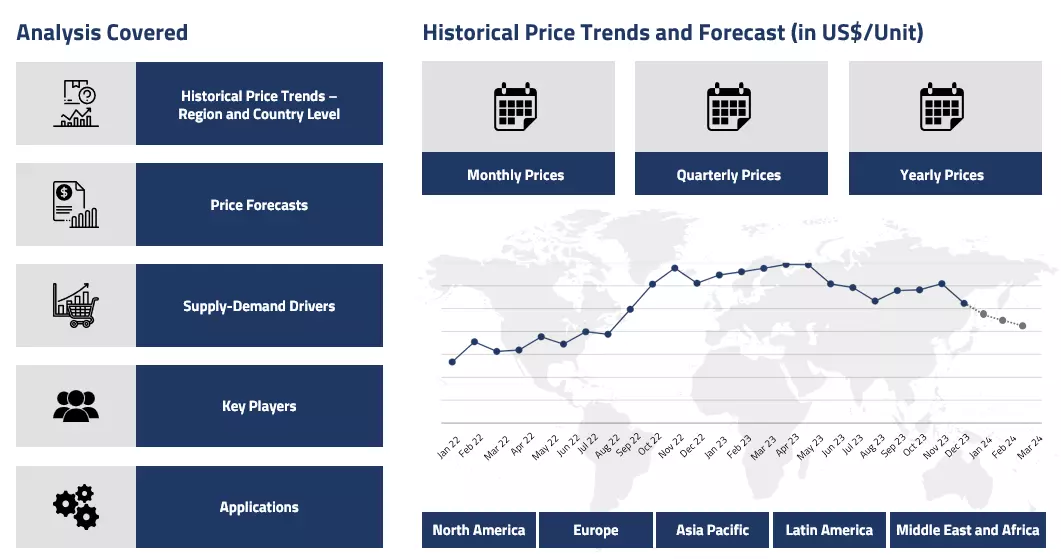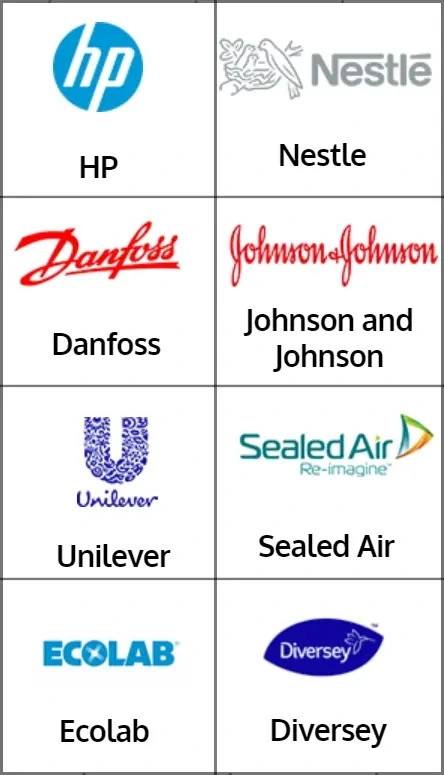Product
Warehouse Construction Cost Trend
Warehouse Construction Cost Trend
Warehouse Construction Regional Price Overview
Get the latest insights on price movement and trend analysis of Warehouse (Factory Unit) Construction in different regions across the world (Asia, Europe, North America, Latin America, and the Middle East & Africa).
Warehouse Construction Cost Trend for Q1 of 2025
In Q1’25, warehouse construction costs in the U.S. rose significantly, with several factors combining to drive up overall project expenses. A major contributor was the introduction of new tariffs by President Donald Trump’s administration, including a 25% duty on foreign steel and aluminium starting March 12. These tariffs led to a sharp spike in prices for essential materials. Developers reported increases in steel costs by 8–20%, depending on their location and contract timing. Copper, aluminium, insulation, roofing materials, and even ceiling tiles saw notable price jumps. For example, a warehouse project in New Jersey saw its budget rise by $2 million due to higher steel prices alone.
Warehouse Construction Cost Chart

Please Login or Subscribe to Access the Warehouse Construction Cost Chart Data
Developers who acted early managed to lock in prices for some materials, but overall construction budgets still went up due to secondary cost pressures. Rebar, roofing, and interior systems often include imported components, making them vulnerable to the broader effects of trade restrictions. These increases didn’t just affect new builds—renovation projects also stalled.
Beyond materials, labor availability and general contractor costs also played a role. Rising energy bills, staffing shortages, and higher operating costs at the supplier level all contributed to upward pressure. While the U.S. real estate market had entered 2025 with positive growth expectations, policy volatility—like the sudden announcement and withdrawal of a 50% tariff on Canadian steel on March 11—introduced risk that left many developers hesitant to move forward with new projects.
In Scotland, construction costs also trended upward but in a more modest and controlled manner. Input costs increased by 3% year-on-year and 0.75% quarter-on-quarter. Labor shortages, especially in skilled trades, and logistics challenges around site access and subcontractor availability were key issues. The sector also faced difficulty converting pre-construction activity into live projects, especially in the public sector where many proposals remained on hold. Regions outside the M8 corridor faced at least a 5% cost premium, and mechanical and electrical work became more expensive due to labor and compliance requirements.
Analyst Insight
Warehouse construction costs are expected to remain high in the near term, with developers closely watching trade policy and supply chain trends before committing to large-scale projects.
Warehouse Construction Cost Trend for the Year 2024
In 2024, warehouse construction costs experienced notable fluctuations influenced by several global and regional factors. The year began with rising costs driven by supply chain issues affecting key materials such as steel, insulation, and concrete. Limited availability and transportation delays led to extended timelines and higher overall project budgets.
Around mid-year, there was a brief period of stability as shipping routes normalized and some material costs eased. However, this did not last long. In the latter half of the year, labor shortages became more severe, particularly in skilled trades like electrical and mechanical installation. This pushed wages up and added pressure to project costs. At the same time, energy price increases raised the cost of producing and transporting essential building materials.
Despite these challenges, some warehouse projects benefited from the growing use of modular construction techniques. This helped reduce labor needs and improved cost control, especially in regions with supportive infrastructure and local manufacturing. Warehouses incorporating automation and energy-efficient systems saw higher upfront expenses, but these were often accepted for long-term savings.
Analyst Insight
According to Procurement Resource, Warehouse Construction costs are likely to stabilize gradually, but labor availability and sustainability requirements will continue to influence pricing trends.
Warehouse (Factory Unit) - Construction Cost Trend for the Second Half of 2023
Throughout the latter half of 2023, the construction industry, especially for warehouse (factory units), witnessed a dynamic interplay of factors shaping its price trajectory. Despite facing challenges such as rising interest rates and stricter lending standards, construction activity remained inclined, fueled by post-pandemic projects and infrastructure demands.
In India, a general normalization in the construction material prices was seen; however, certain materials, such as MEP components and concrete, experienced double-digit increases due to heightened demand. The easing of the material squeeze, however, did not fully alleviate cost concerns, as natural disasters like wildfires and hurricanes intermittently disrupted supplies, leading to temporary price spikes, notably observed in lumber following such events.
Beyond material costs, labor emerged as a pressing challenge for the industry. A shortage of skilled labor pressurized the cost dynamic. In the USA, some respite was felt after a roller coaster ride through inflation in the early months. In UAE, a rise in construction activities was witnessed despite the coupled rise in incurring costs.
Analyst Insight
According to Procurement Resource, the Warehouse (Factory Unit) - Construction Costs are likely to incline in major global regions as the raw material and process charges are surging continuously.
Warehouse Construction Cost Trend for the First Half of 2023
Indian warehouse and factory units are witnessing a lot of development in the period under discussion. Being the fastest growing big economy, Indian industrial development is regularly posing demands for more supporting infrastructure.
Global private equity giant Blackstone Group has decided to raise its warehouse portfolio in India by around 2.5 times. It aspires to take it to around 100 million square feet from the current 40 million sq ft within the next 3-5 years. Sumadhura Infracon also acquired around 100 acres of land in the Bangalore outskirts for warehousing. Overall, the Warehouse (Factory Unit) sector is witnessing a very positive market outlook in the current times.
Analyst Insight
According to Procurement Resource, the future projections look very promising for the Warehousing sector. The ongoing rise in digital marketplaces is offering high demands for warehousing units.
Warehouse Construction Cost Trend (Q2, Q3 and Q4 of 2022)
During the said period, the construction costs for warehousing have increased by 10% since the pandemic. The construction costs for Grade A warehousing rose from 9.26% to 10.44%, with Mumbai and Kolkata seeing the highest cost increase for warehousing spaces. These high costs are directly impacted by the inflated costs of construction materials like steel, copper, cement, glass, wood, etc.
The abnormal crude oil prices influenced the power prices and thus its consumption patterns. Another factor influencing warehousing construction costs is a shortage of skilled labour. The global market saw an overall 79.6% shortage of skilled labour. Hence, the warehouse ( factory unit) construction costs kept high during the said period.
Analyst Insight
The demand for warehousing is likely to remain unscathed in the coming years; however, the growth will depend on the apparent construction costs.
Warehouse Construction Cost Trend (Q1 2022)
Asia
Building commodity prices in Singapore continued to stay at record high levels in 2022 as the sector contended with inflation, high material costs, and a shortage of experienced labour. It is anticipated that real construction output will exceed pre-pandemic levels by the end of this year. Metal, lumber, and other building materials prices skyrocketed in 2021, affecting major international cities in Asia Pacific, and the record high prices are expected to last through the rest of 2022.
North America
Building materials in the United States increased by 1 % on average from Q3 2021 to Q4 2021. Many specific material costs remained much higher than they were at the same time last year. Copper wire costs were more than quadruple in January 2022 compared to January 2021. Copper prices have risen dramatically as a result of high expectations of demand and supply restrictions, as well as the US economy's continued recovery.
Although PVC is a suitable alternative to copper, its price has risen in lockstep with copper pipe pricing. Changes in material costs have an impact on a property's final rebuilding cost. Throughout the second half of 2021, lumber prices were stable, resulting in less variation in rebuilding costs from state to state (ranging from -1.6% to 0.76%, depending on the state) and a drop in the national average cost (-0.35 percent ) from Q4 2021 to Q1 2022.
Warehouse Construction Cost Trend (Q4 2021)
Asia
India witnessed a sharp rise in construction material prices like steel, iron and cement in the final quarter of 2021 which in turn increased the construction costs. The prices of major materials like aluminum increased rapidly as a result of rise in fuel prices.
The labour prices had also increased which in turn caused the housing prices to increase. In Andhra Pradesh construction costs increased by 30-40% following a price rise of cement from 300 INR/bag to 450 INR/bag. Steel price rose from 47,000 INR/MT to about 69,000 to 72,000 INR/MT along with price rise for plumbing, tiles and electricity.
Europe
The construction output in terms of volume fell by 1.8% in October 2021 in UK due to rise in prices of materials like timber, steel, glass and concrete along with problems in supply chain and labour shortages. However, the demand remained firm with new housing projects on the way.
North America
In December, the raw material price had fallen but the construction prices continued to skyrocket in the US. The price of steel mill products increased by 0.2% in the final quarter followed by a rise in construction prices by 20% in the year 2021.
The rise in prices were a result of an increase in the number of upcoming construction projects in the region along with a rise in raw material prices. For example, plastic production products prices increased by 1.3% in December, while the prices for plywood and lumber increased by 17.6% and 12.7% respectively, amidst rising inflation for housing products in the region.
Latin America
In the Latin American countries like Brazil, inflation continued to increase the prices for construction along with raw material, labour and fuel prices as the country registered a poor economic growth due to political issues, supply shortages, poor post-pandemic recovery and the dropping value of Real against the US dollar.
Warehouse Construction Cost Trend (Q1-Q3 2021)
Asia
Construction grew significantly in Asia in spite of the pandemic and other economic challenges which were followed by a surge in investments in infrastructure projects along with a spike in demand for residential construction.
The costs in India increased by 3.8% in the third quarter of 2021 as timber and other metal materials of construction faced supply shortages in the region. The Construction Activity Index (CAI) rose strongly in countries like Australia, New Zealand and Philippines while it was negative in Sri Lanka, Malaysia and Singapore.
Europe
The construction costs in Europe skyrocketed in July after rising for 7 consecutive months in 2021 following a price rise of the raw materials. In Belgium, the timber prices increased by 29%. The demand for construction activities were high as most people started to work from home during the lockdowns in the pandemic.
The supply shortages along with inflation drove up the prices in the region. Labour shortage was yet another contributor to the price rise. The price for circuit board materials like copper, resistor, semiconductors, connectors and capacitors had also increased by 10% in 2021. The price hike in ocean freight, timber and cement prices also elevated the construction costs in Europe.
North America
In 2021, the construction costs in the US continued to rise sharply well into August following a price rise of the raw materials by double-digit percentage increase. In 2021, the plywood and lumber costs increased by 15.9%. The brass and copper prices too increased by 45.3% while aluminum prices increased by 35.1%.
Plastic and gypsum products increased by 29.6% and 22.9% respectively while the insulation material prices rose by 17.2%. The prices for asphalt, siding products and tar roofing also increased by 15.8%. Apart from material costs, the transportation and fuel costs also increased. The freight transportation costs had jumped by 14.1%. Inflation and supply chain issues including shipment delays also contributed to the rise in construction prices in the US.
Latin America
Peru witnessed one of the highest growths in the construction market in Latin America in 2021 by almost 17%. Other countries in the region like Brazil, Argentina and Mexico were reported to have grown their construction sectors by 1.6% to 5.4%.
Warehouse Construction Cost Trend Overview 2020
Asia
In the second quarter of 2020, the construction market conditions continued to worsen. The Construction Activity Index in Asia-Pacific had gone down by 26 points which was in line with the global drop of 24 points. In Malaysia, the construction index had dropped by 65 points whereas in China the drop was of 8 points. Due to the pandemic and lockdown restrictions followed by it, the demand of the industry contracted in Asia-Pacific.
In countries like India and Philippines, a sharp drop in demand was witnessed as compared to China in which demand declined and rebounded after the second quarter. In quarters 3 and 4, the conditions for the industry in India eased a bit. Due to labour shortages, the construction costs rose sharply in the second quarter in India but eased gradually in the later quarters of the year 2020.
In Delhi the average fit-out cost was 64 USD/ft2 whereas in Ahmedabad it was 57 USD/ft2. Tokyo witnessed a construction boom amidst labour shortage and the construction cost for an office space was as expensive as 179 USD/ft2 although the average cost in the region was 93 USD/ft2.
Europe
Construction outputs decreased in the beginning of the second quarter of 2020 by 30% as compared to the first quarter in Europe. In France, a lot of construction sites had been shut down due to the pandemic and the country experienced the largest drop in production volumes in the region.
In Netherlands and Germany, however, there was little to no change observed in the industry as most construction sites continued to operate in spite of the pandemic. In the second half of the year, several sites re-opened as the lockdowns were lifted and the industry rebounded.
The production volumes in France in October 2020 were only 5% less as compared to those in January 2020. The number of dwelling permits in Turkey, Austria and the Netherlands had decreased in the first three quarters of 2020.
Belgium, Spain and France witnessed the highest drop in the issue of non-residential permits in 2020. In the first half of 2020, the production of building materials also witnessed a significant decline in terms of volume in Spain and France which recovered later in November 2020 to the pre-pandemic levels.
North America
The average construction costs in the US in 2020 rose by 2.03% in spite of the covid-19 pandemic. The costs varied on the basis of state and building sector. For example, in Las Vegas, the construction cost for a warehouse space was 70 USD/ft2 whereas, in Los Angeles the cost for a general hospital was 930 USD/ft2.
The industry grew in the pandemic as several essential projects in the country were allowed to be continued due to which the costs continued to increase with the increase in labor and raw material costs. In June 2020, however, the construction costs fell by 2.2% for the first time in 10 years even though the raw material prices had increased. The fall was a result of fall in demand of construction services.
Latin America
In Latin America, the government-imposed lockdown restrictions lasted longer than countries in other regions of the world which drastically affected the economic activities in the region. In Mexico, there was limited growth in the economy and almost no foreign investments. The value of peso dropped against the US dollar, affecting the raw material and equipment prices imported from other countries. In Chile, public demonstrations and anti-government movements led to a social crisis which decreased the private investments.
The construction industry therefore saw an 18% drop in prices as the market contracted in the region. In Argentina, the construction prices rose sharply as a result of inflation due to weak government policies after the lifting of lockdowns in the region by the end of 2020. In Brazil, the value of Real against the US dollar had weakened by 30% in 2020 which caused an inflation in construction rates which grew by 4.6%.
Procurement Resource provides latest prices of Warehouse (Factory Unit) - Construction Cost. Each price database is tied to a user-friendly graphing tool dating back to 2014, which provides a range of functionalities: configuration of price series over user defined time period; comparison of product movements across countries; customisation of price currencies and unit; extraction of price data as excel files to be used offline.
About Warehouse Construction
A Warehouse refers to a planned space dedicated to the storage of raw materials or manufactured goods. Prior to the distribution and sales, these goods are kept here. A Warehouse may range from a spare room, basement, or garage, to a large space in a building particularly designed for storage. It can be customised, and pre-engineered based on requirements.
The construction cost of a Warehouse (Factory Unit) includes the base metal building package along with delivery, construction and foundation. Some of the major factors influencing the prices of warehouse construction are land cost, immediate market conditions, raw materials, and warehouse type. Further, cost-saving design solutions must be discovered while building any warehouse facility as they help minimise cost and build maximum value.
Warehouse Construction Product Details
| Report Features | Details |
| Product Name | Warehouse (Factory Unit) - Construction Cost |
| Region/Countries Covered | Asia Pacific: China, India, Indonesia, Pakistan, Bangladesh, Japan, Philippines, Vietnam, Iran, Thailand, South Korea, Iraq, Saudi Arabia, Malaysia, Nepal, Taiwan, Sri Lanka, UAE, Israel, Hongkong, Singapore, Oman, Kuwait, Qatar, Australia, and New Zealand Europe: Germany, France, United Kingdom, Italy, Spain, Russia, Turkey, Netherlands, Poland, Sweden, Belgium, Austria, Ireland Switzerland, Norway, Denmark, Romania, Finland, Czech Republic, Portugal and Greece North America: United States and Canada Latin America: Brazil, Mexico, Argentina, Columbia, Chile, Ecuador, and Peru Africa: South Africa, Nigeria, Egypt, Algeria, Morocco |
| Currency | US$ (Data can also be provided in local currency) |
| Supplier Database Availability | Yes |
| Customization Scope | The report can be customized as per the requirements of the customer |
| Post-Sale Analyst Support | 360-degree analyst support after report delivery |
Note: Our supplier search experts can assist your procurement teams in compiling and validating a list of suppliers indicating they have products, services, and capabilities that meet your company's needs.
Methodology
The displayed pricing data is derived through weighted average purchase price, including contract and spot transactions at the specified locations unless otherwise stated. The information provided comes from the compilation and processing of commercial data officially reported for each nation (i.e. government agencies, external trade bodies, and industry publications).
Assistance from Experts
Procurement Resource is a one-stop solution for businesses aiming at the best industry insights and market evaluation in the arena of procurement. Our team of market leaders covers all the facets of procurement strategies with its holistic industry reports, extensive production cost and pre-feasibility insights, and price trends dynamics impacting the cost trajectories of the plethora of products encompassing various industries. With the best analysis of the market trends and comprehensive consulting in light of the best strategic footstep, Procurement Resource got all that it takes.
Client's Satisfaction
Procurement Resource has made a mark for itself in terms of its rigorous assistance to its clientele. Our experienced panel of experts leave no stone unturned in ensuring the expertise at every step of our clients' strategic procurement journey. Our prompt assistance, prudential analysis, and pragmatic tactics considering the best procurement move for industries are all that sets us apart. We at Procurement Resource value our clients, which our clients vouch for.
Assured Quality
Expertise, judiciousness, and expedience are the crucial aspects of our modus operandi at Procurement Resource. Quality is non-negotiable, and we don't compromise on that. Our best-in-class solutions, elaborative consulting substantiated by exhaustive evaluation, and fool-proof reports have led us to come this far, making us the ‘numero uno' in the domain of procurement. Be it exclusive qualitative research or assiduous quantitative research methodologies, our high quality of work is what our clients swear by.
Related News
Table Of Contents
Our Clients

Get in Touch With Us

UNITED STATES
Phone:+1 307 363 1045

INDIA
Phone: +91 8850629517

UNITED KINGDOM
Phone: +44 7537 171117
Email: sales@procurementresource.com




